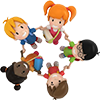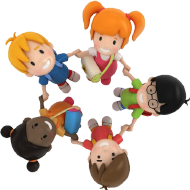
May celebrates two very important occupations
|
||
|
May is Better Hearing and Speech Month. We would like to take this opportunity to raise awareness about communication disorders and the role of the Speech-Language Pathologist in providing treatment to assist with communication skills. Parents often wonder if their child’s speech and language skills are developing normally. The complicated foundation of language skills begins at birth. Children develop certain skills at different times as they move through early stages of learning language. On the average, children learn to read by age seven, but that is dependent upon their acquisition of a good foundation of skills. As children grow and develop, they begin listening for different purposes and responding with words instead of sounds and gestures. Receptive language (understanding) precedes expressive language (speaking). Receptive and expressive language skills lay the foundation for future success in reading and writing. These skills develop as children have opportunities to listen to and talk with others. Children must be able to understand words before they are able to produce and use them effectively. The following is a list of milestones that children learn and begin to develop their language skills. Keep in mind that children vary in how and when they develop and learn these skills. These are not in a concrete order. From birth to age 3 most babies and toddlers become able to:
From ages 3 to 4 most preschoolers become able to:
At age 5 most kindergartners become able to:
At age 6 most first-graders can:
There are various areas of communication that a speech therapist can evaluate and treat.
If you have questions or concerns about your child’s progress, talk with your child’s doctor, teacher, or a speech language pathologist. For children with any kind of disability or learning problem, the sooner they get the special help they need, the easier it will be for them to learn. Technology HubTech Tips from American Speech-Language-Hearing Association
Speech APPS of the month.
icommunicate- Smart Oral Motor – This application does not replace the need for a full evaluation by a licensed professional such as an occupational therapist or a speech therapist. Therapist will evaluate and provide full guidance on how to best use this application. If parents are working with their therapists in trying to develop a home program for their child, this can be very user friendly and engaging resource. abc Pocketphonics: letter sounds & writing + first words – Apps in My Pocket Ltd
Quote of the Month
“Yesterday is history. Tomorrow is a mystery. Today is a gift. That’s why we call it ‘The Present’.”  Activity Corner
Elephant Trunk Craft- This adorable elephant is perfect for oral motor activities. Kids can practice lip rounding, breath support, blowing, and sucking through the elephant’s nose. You can use different objects for the nose such as, straws, whistles, pipes, etc. |
“We’ll go to the doctor when we feel flu-ish or a nagging pain. So why don’t we see a health professional when we feel emotional pain: guilt, loss, loneliness? Too many of us deal with common psychological-health issues on our own, says Guy Winch. But we don’t have to. He makes a compelling case to practice emotional hygiene — taking care of our emotions, our minds, with the same diligence we take care of our bodies. Here is a segment from Guy Winch’s lecture on: “Why we all need to practice emotional first aid”“We sustain psychological injuries even more often than we do physical ones, injuries like failure or rejection or loneliness. And they can also get worse if we ignore them, and they can impact our lives in dramatic ways. And yet, even though there are scientifically proven techniques we could use to treat these kinds of psychological injuries, we don’t. It doesn’t even occur to us that we should. “Oh, you’re feeling depressed? Just shake it off; it’s all in your head.” Can you imagine saying that to somebody with a broken leg: “Oh, just walk it off; it’s all in your leg.” (Laughter) It is time we closed the gap.” between our physical and our psychological health. It’s time we made them more equal, more like twins. Below, you’ll find books on everything from applying cognitive therapy for anxiety reduction to parenting well to living a meaningful life to supporting a child through eating disorder recovery. 9 Psychologist-Approved Must-Reads on Mental Health Psychologists are a discerning bunch when it comes to books. Because of their insider’s view of mental health and psychology, they’re able to sharply judge a book’s accuracy and value. 1. The Feeling Good Handbook by David Burns According to psychologist and attention expert Lucy Jo Palladino, Ph.D, this book offers “A clear, useful explanation of the benefits and techniques of cognitive therapy, with self-help instruction for depression, low self-esteem, anxiety, fears, phobias, communication problems and more.” (Feeling Good Handbook on Amazon.com) 2. Spark by John Ratey A second pick of Palladino, this book is “An intelligent presentation of new research on the vital link between brain health and physical movement.” She adds: “Read it first for the valuable information; then reread the parts that renew your motivation to exercise regularly to improve your concentration, mood and resilience to stress.” (Spark on Amazon.com) 3. How to Talk So Kids Will Listen and Listen So Kids Will Talk by Adele Faber and Elaine Mazlish This book, Palladino says, helps “busy parents…raise capable, cooperative, emotionally stable children.” Specifically, she says that it’s “based on the brilliant work of Dr. Haim Ginott, and full of helpful cartoons, bulleted summaries, and simple yet effective exercises.” (How to Talk So Kids Will Listen and Listen So Kids Will Talk on Amazon.com) 4. Siddhartha by Herman Hesse Jeffrey Sumber, M.A., psychotherapist, author and teacher, recommends this book often to “clients confronting their meaning in life.” Siddhartha is about “the journey of a young man on a quest to know himself and charts the sometimes confusing choices he makes in order to find a sense of deep peace.” He says that “…the book provides enough real analogies to our modern lives with enough emotional distance to make it a perfect teaching tool for therapy.” (Siddhartha on Amazon.com) 5. Get Out of Your Mind and Into Your Life by Steve Hayes According to anxiety specialist Chad LeJeune, Ph.D, this is “a challenging title for a challenging book, but one very much worth the effort. It provides “a revolutionary way to look at [readers’] experience of themselves and of life.” Specifically, Hayes “talks about how trying to avoid uncomfortable feelings or situations limits our life too much, so by learning to accept and tolerate those discomforts, we can pursue a bigger, more interesting, and more meaningful life,” says ADHD expert Ari Tuckman, Ph.D, who also recommends the book. (Get Out of Your Mind and Into Your Life on Amazon.com) 6. Help Your Teenager Beat an Eating Disorder by James Lock and Daniel le Grange. Elizabeth M. Davis, PsyD, clinical director of child and adolescent services for the Eating Recovery Center, says this book has “been essential in my helping parents and loved ones gain a greater sense of eating disorders and their role in recovery.” Like the book below it, Help Your Teenager Beat an Eating Disorder helps to foster “greater awareness of oneself in the treatment process” and educates loved ones on how to best give support. (Help Your Teenager Beat an Eating Disorder on Amazon.com) 7. Skills-based Learning for Caring for a Loved One with an Eating Disorder by Janet Treasure, Grainne Smith and Anna Crane Another one of Davis’s essential reads on eating disorders, this book provides practical pointers and evidence-based information for supporting a loved one. She also says that both books are “helpful for assisting parents in letting go of their guilt and shame during the treatment process, which has little to no room in the road to recovery for these families.” (Skills-based Learning for Caring for a Loved One with an Eating Disorder on Amazon.com) 8. Intimacy and Desire: Awaken the Passion in Your Relationship by David Schnarch Tuckman recommends this book to individuals struggling in their relationships. He cautions that “It can be sexually explicit at times, but has lots of great information for people looking to improve both their relationship and their own individual dynamics.” (Intimacy and Desire: Awaken the Passion in Your Relationship on Amazon.com) 9. The Anxiety and Phobia Workbook by Edmund Bourne This book is valuable for anyone struggling with anxiety, Tuckman says. It “has tons of good information about causes of anxiety, treatment options, and lots of strategies to address it.” (The Anxiety and Phobia Workbook on Amazon.com) Additional Resources The above psychologists have also written various valuable books, including: The Worry Trap: How to Free Yourself from Worry & Anxiety using Acceptance and Commitment Therapy by Chad LeJeune Dreamers, Discoverers, and Dynamos: How to Help the Child Who is Bright, Bored, and Having Problems at School by Lucy Jo Palladino Find Your Focus Zone: An Effective New Plan to Defeat Distraction and Overload by Lucy Jo Palladino More Attention, Less Deficit: Success Strategies for Adults with ADHD by Ari Tuckman Here is a list of Children’s Therapy Connections Referral resources: Benchmark Psychiatric Services, LTD. Lifeline Behavioral Healthcare Chicago Neurobehavioral Specialists Dr. M. Denise Fraser Vaselakos, Psy.D. PIN OF THE MONTHARK’s Krypto-Bite Chewable Gem Necklace. Comes in three different strengths. Great to use for oral input.  |
|
|
If you have questions about your child’s development, call us at (708) 226-9200 or |
||
|
14711 Ravinia Ave. Orland Park, Il 60462 |
||



